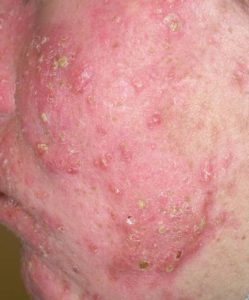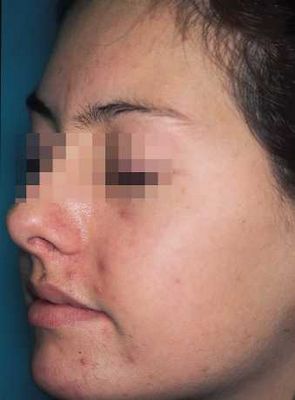
Comedones: The Latin name for comedones, comedus, refers to "porous" comedones. Comedones: The plural number of comedones, the main cause of acne, consists of narrowed (closed) hair-like follicles containing the same keratin (sebum). , bacteria and bacteria. Comedones can be open or closed.
Open comedones are an open hole in the skin that allows bacteria and sebum to build up inside. This type of comedone can cause irritation and infection if left untreated.
Closed comedones are made up of keratin plates and bacteria that have already taken up residence inside the hair follicles and blocked the opening, sealing the pores. The papillae, or vesicles in closed comedones, become painful when touched or squeezed.
Comedones are classified into closed comedones, open comedones, subtypes of closed comedones, and subtypes of open comedones. Comedones are classified not only by size, but also by color, size, shape, surface texture, and appearance. Comedones from acne can also be classified as superficial acne (the type that is most commonly treated), acne nodosum, cystic acne, or inflammatory acne.
Nodulocystic acne is characterized by raised or flat nodules or cysts that appear on the surface of the skin as red, inflamed papules or nodules. Cystic acne is a condition in which more than one type of nodule is present. While most nodules are flat, depressed areas, some cystic acne cysts may appear as sharp and red edges that are sometimes surrounded by white tissue filled with pus.
Inflammatory pimples are characterized by redness, swelling, blistering, soreness, inflammation, crusting, and discharge. It also has the most severe manifestation of cystic nodular acne.
Besides treating nodular cystic acne with topical or oral antibiotics, topical retinoids, phototherapy, or retinoids, there are other treatments for nodular acne. The most popular treatments for inflammatory acne include salicylic acid, an oxidizing agent that exfoliates and removes dead skin cells and the formation of dead skin cells.
A combination of salicylic acid, benzoyl peroxide, or azelaic acid is a common ingredient in many over-the-counter acne products. It is effective in treating both comedones and nodular cystic acne. Other topical and oral medications used to treat inflammatory acne include Retin-A, Accutane, and Tazarotene, which have been shown to be effective against flare-ups of acne.
There are many over the counter medications for treating comedones that also treat nodulocystic acne. Oral retinoids and Accutane are often prescribed together to reduce the number of comedones on the skin surface. These two acne medications are not only effective at reducing nodular acne, but they also reduce the amount of dead skin cells on the face, which helps to prevent the formation of acne scars. Accutane is also effective at reducing the amount of sebum produced by the sebaceous glands, thereby reducing the oil secretions that clog the hair follicles and clog the skin pores.

There are many herbal supplements that are useful for treating acne, including those that help to control sebum production. or that provide antibacterial activity to the skin pores. There are also natural remedies that provide a soothing effect to the skin, such as tea tree oil and lemon juice.
There are also prescription medications that are available for the treatment of comedones. Topical retinoids can help to treat comedones and nodulocystic acne by controlling the formation and/or production of acne.
Comedones are usually treated with Accutane, Retin-A, or Benzoyl peroxide, because they do not respond well to oral antibiotics. These acne medications work effectively by reducing androgen levels in the body. It is important that people with acne be informed about the potential side effects of Accutane, Retin-A, and Benzoyl peroxide, such as allergic reactions, skin peeling, irritation, dryness, redness, itching, and scaly skin.
There are no proven medications available that can completely eliminate comedones in all cases of acne, so it is best to see a dermatologist if you have very severe cases of acne. Because of this, it is important to follow any medical and/or topical acne prescription for a few weeks or months before considering other treatments for acne, and to make sure that the medications you are using do not cause further harm to your skin.